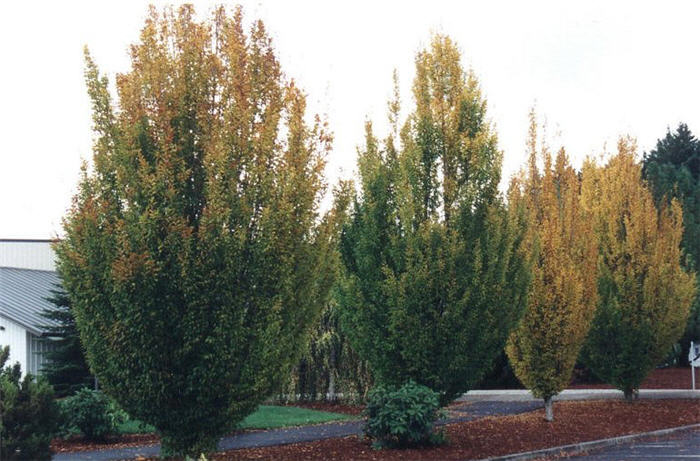| Botanical Name: Carpinus betulus 'Fastigiata' | |
| Common Name: Pyramidal European Hornbean |

-
Anatomy
-
Culture
-
Design
Plant Type
Tree
Height Range
25-40'
Flower Color
Green, Yellow
Flower Season
Spring
Leaf Color
Dark Green
Bark Color
Grey
Fruit Color
Brown
Fruit Season
Summer, Fall
Sun
Full, Half
Water
Medium
Growth Rate
Slow
Soil Type
Clay, Loam, Rocky, Unparticular
Soil Condition
Average, Rich, Poor, Well-drained, Moist, Dry
Soil pH
Acid, Neutral, Basic
Adverse Factors
n/a
Design Styles
English Cottage, Formal, Mediterranean, Spanish
Accenting Features
Fall Color, Silhouette
Seasonal Interest
Summer, Fall
Location Uses
Background, Shrub Border, Walls / Fences
Special Uses
Hedge, Screen, Mass Planting, Wind Break, Shade Tree, Small Spaces
Attracts Wildlife
n/a
Information by: Stephanie Duer
Photographer:
Photographer:
-
Description
-
Notes
This Hornbeam is narrow when young, spreading into a broad cone-shape with age. Grows 35 feet tall and about 20 to 25 feet wide. Dark green, slightly toothed leaves turn yellow in the fall, and the foliage persists into the early winter months. Flowering catkins form in early spring before the foliage emerges; male catkins are yellowish and female catkins are greenish. Fruits are small nutlets in 3-lobed bracts that appear in drooping 5-inch long clusters in summer. Symmetrical and formal in appearance.
Grow in sun to part shade in well-drained soil, in any but sandy soils. It requires little prunng to maintain its tidy appearance, though it will tolerate some shaping if a hedge-like look is desired. It is heat and drought resistant, and seems to be relatively free of disease and pest problems.